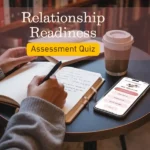Table of Contents
- Introduction
- 1. Self-Awareness: The Foundation of Connection
- 2. Effective Communication: The Key to Understanding
- 3. Building Trust: The Bedrock of Lasting Relationships
- 4. Setting Healthy Boundaries: A Step Towards Respect
- 5. Finding Common Ground: Shared Values and Interests
- 6. Handling Conflict: Growth Through Challenges
- 7. Nurturing Relationships: Keeping the Spark Alive
- Conclusion
- Frequently Asked Questions
Introduction
In today’s fast-paced world, finding the right partner and cultivating meaningful relationships can feel like a daunting task. However, mastering the art of connection is essential for building lasting relationships that provide joy, support, and understanding. This guide aims to equip you with the essential dating fundamentals that will empower you to create and sustain deep connections.
The journey of dating is not just about finding someone to share your life with; it’s about learning to connect with others in a way that is genuine and fulfilling. By embracing self-awareness, enhancing communication, and cultivating trust, you can form bonds that withstand the test of time. Throughout this article, we will explore key principles and practical tips that can transform your dating experience and lead to lasting love.
No matter where you are on your relationship journey, whether you are just starting to date or looking to deepen your current relationship, understanding these fundamentals will serve as your guiding light. Let’s delve into the first essential principle: self-awareness.
1. Self-Awareness: The Foundation of Connection
Self-awareness is the cornerstone of any healthy relationship. It involves understanding your values, beliefs, preferences, and emotional triggers. When you are self-aware, you can communicate more effectively and establish healthier boundaries with potential partners.
Take some time to reflect on what you truly want from a relationship. Consider your long-term goals, your non-negotiables, and what qualities you admire in a partner. Journaling can be a powerful tool for this process, as writing encourages introspection and clarity.
Key Points
- Recognize your strengths and weaknesses.
- Understand your relationship goals.
- Identify your emotional triggers.
- Reflect on past relationship patterns.
Expert Tips
1. Regularly reflect on your feelings to enhance emotional awareness.
2. Consider seeking feedback from trusted friends about your dating patterns.
3. Engage in activities that boost your self-esteem.
Real-World Example
Meet Sarah, who realized in her previous relationships that she often compromised her needs for others. After acknowledging this pattern, she worked on defining her non-negotiables and learned to communicate them clearly in new relationships.
2. Effective Communication: The Key to Understanding
Communication is the bridge between hearts. Learning to communicate clearly and authentically is paramount in dating as it helps prevent misunderstandings and fosters a deeper connection. Practice active listening by being fully present in conversations, allowing your partner to express themselves without interruptions.
Additionally, use “I” statements to express your feelings. For example, saying “I feel upset when plans are changed at the last minute” helps articulate your emotions without placing blame.
Key Points
- Practice active listening during discussions.
- Use “I” statements to express feelings effectively.
- Be open to feedback and encourage honest dialogue.
- Check in with your partner regularly about their feelings.
Expert Tips
1. Allocate time for regular, uninterrupted conversations.
2. Be honest but empathetic in your communication.
3. Use body language and tone effectively to convey warmth.
Real-World Example
During a disagreement, Tom expressed his feelings by saying, “I felt ignored during dinner,” rather than accusing his partner of not caring. This not only diffused the tension but also prompted a healthy conversation about each other’s needs.
3. Building Trust: The Bedrock of Lasting Relationships
Trust is vital in any relationship and forms the bedrock upon which deep connections are built. Trust develops over time through consistent actions, reliability, and open communication. Be transparent with your intentions and follow up on your commitments to demonstrate reliability.
Additionally, share your vulnerabilities. Letting your partner see you at your most authentic creates an environment where they can feel safe to be themselves, which strengthens your mutual trust.
Key Points
- Be reliable: Follow through on promises.
- Share your feelings and vulnerabilities openly.
- Respect your partner’s boundaries.
- Foster a non-judgmental environment for open discussions.
Expert Tips
1. Trust takes time to build; be patient.
2. Review your actions to ensure they align with your words.
3. Address issues directly rather than allowing resentment to build.
Real-World Example
Lisa and Mark initially faced trust issues due to past relationships. By consistently demonstrating reliability and having open conversations about their feelings, they were able to cultivate a strong trust in their partnership.
4. Setting Healthy Boundaries: A Step Towards Respect
Establishing healthy boundaries is essential for any fruitful relationship. Boundaries protect your emotional space and ensure that both partners feel respected. Discuss your boundaries early in the relationship to prevent misunderstandings later.
Always communicate your boundaries clearly and assertively, and encourage your partner to do the same. Remember that boundaries are not walls but rather guidelines that foster a safe environment for emotional exchange.
Key Points
- Identify your personal boundaries and communicate them.
- Respect your partner’s boundaries as well.
- Adjust boundaries as necessary throughout the relationship.
- Reinforce your boundaries without feeling guilty.
Expert Tips
1. Regularly discuss boundaries as your relationship evolves.
2. Don’t be afraid to say no when something doesn’t feel right.
3. Be open to adjusting boundaries respectfully over time.
Real-World Example
When Jason articulated his need for alone time every week, his partner was initially concerned. However, this candid conversation allowed them to set clear expectations, resulting in a more balanced relationship.
6. Handling Conflict: Growth Through Challenges
Conflict is a natural part of any relationship. How you handle disagreements can make or break your connection. It’s important to approach conflicts with an open mind, focusing on resolution rather than winning an argument.
Practice non-confrontational techniques, such as taking breaks during heated discussions and returning to the conversation when both parties are calmer, prevents escalation and promotes respectful dialogue.
Key Points
- Focus on understanding rather than winning when arguments arise.
- Avoid blaming language; use “I” statements.
- Take breaks if conversations become too heated.
- Seek to find common ground and negotiate solutions.
Expert Tips
1. Practice active listening during disagreements.
2. After a conflict, check-in with each other about feelings.
3. Consider seeing a therapist together for unresolved issues.
Real-World Example
After a misunderstanding, Julie and Rob decided to take a break from the conflict. Upon returning to the conversation later, they were able to express their feelings more clearly and resolve the issue amicably.
7. Nurturing Relationships: Keeping the Spark Alive
Nurturing your relationship is crucial in maintaining long-lasting bonds. Make it a priority to express love and appreciation regularly. Small gestures, compliments, and quality time together can significantly enhance your connection.
Plan regular date nights or spontaneous outings to keep the excitement alive. Encourage each other to grow both individually and as a couple, ensuring that your relationship evolves positively with time.
Key Points
- Prioritize quality time together regularly.
- Engage in new experiences to create shared memories.
- Express gratitude and appreciation often.
- Support each other’s personal growth and passions.
Expert Tips
1. Schedule regular check-ins with each other to discuss the relationship.
2. Celebrate achievements together, both big and small.
3. Occasionally surprise your partner to show you care.
Real-World Example
When Carla surprised her partner with a weekend getaway, it reignited their connection and reminded them of the joy of spontaneity in their relationship.
Frequently Asked Questions
1. How can I improve my dating skills?
Focus on self-awareness, communication, and understanding your relationship goals. Practice engaging more readily in conversations and take time to reflect on your experiences.
2. What should I do if I feel nervous on a date?
Practice mindfulness techniques like deep breathing beforehand. Remember that it’s perfectly normal to feel nervous, and try to view the date as an opportunity to learn about someone new.
3. How can I tell if a relationship is healthy?
A healthy relationship includes respect, trust, open communication, and the ability to handle conflict constructively. If your partner encourages your personal growth and well-being, it’s a good sign.
4. How do I know when to try harder or let go?
Assess whether the relationship brings you joy and fulfillment. If the effort feels one-sided or if you consistently feel undervalued, it may be worth considering whether to stay invested or move on.
5. What are some effective ways to communicate feelings?
Use “I” statements to express how certain situations make you feel, listen actively to your partner’s responses, and ensure open dialogue that allows both parties to share their thoughts.
Conclusion
Mastering the art of connection is a beautiful journey that evolves over time. By understanding the core fundamentals discussed in this article—self-awareness, effective communication, trust building, managing boundaries, and nurturing relationships—you create a strong foundation for lasting connections.
As you practice these essential dating skills, remember that relationships are partnerships built on mutual respect and growth. Embrace the journey with an open heart, and allow yourself to learn from both the challenges and the joys that come with dating. Each experience is an opportunity to enhance your understanding and appreciation of love.
Whether you’re just beginning to explore dating or are in a committed relationship, take these principles to heart. Nurture your connections, and have the courage to be genuine. This journey is about more than just finding love; it’s about mastering the art of connecting deeply with others, building a life rich in purpose and fulfillment.














